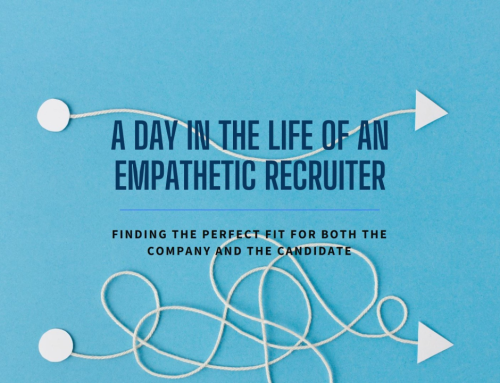“Being a brand ambassador is the entire point of recruiting, and done well its entire competitive advantage.” – Matt Charney, Chief Content Officer at Allegis Global Solutions
Candidates are consumers
For most candidates, the initial interview with recruiters and/or hiring managers is their first real impression of the organization – and, as we all know, first impressions matter. Four out of five jobseekers believe candidate experience is an indicator of how much a company values its people, while 72% of candidates would want to talk to a recruiter or hiring manager before applying (CareerBuilder, 2017).
It is well known poor candidate experience costs an organization potentially high-performing employees, not only in the present round of hiring but in the longer term. 95% of jobseekers reject offers due to a negative impression of the organization (CareerBuilder, 2014), while 58% would not apply to the organization in the future (IBM, 2017). By creating a suboptimal experience in
even one round of hiring, organizations risk reducing their pool of good candidates in the long term.
Consumers, likewise, have more choices available to them than ever before. They no longer expect products and services to merely provide high quality for a reasonable price, but to engage them, inspire them, and align with their values.
Candidates are consumers, as are the people in their social networks:
25% of job seekers stop purchasing products or services from a company following a poor candidate experience (Ph.Attraction, 2016);
58% will criticize an organization they do not trust to a friend or colleague (Edelman 2015 Trust Barometer);
60% of people rely primarily on recommendations from family/friends when selecting a product or service (Deloitte, 2014).
Nearly two-thirds (63%) of consumers refuse to buy products and services from a company they do not trust (Edelman 2015 Trust Barometer).
These statistics mean potentially a company with a poor recruitment process would not only face substantial issues in the long term but also lose substantial revenue as a result of negative brand perception. This, in turn,makes attracting the best candidates even more resource-intensive – 69% of people indicate they would not accept a job offer from a company with a bad reputation, even if they were presently unemployed (Allegis Group Services Study, 2012).
Recruitment is an expert field
Your Recruiters have the closest communication with people outside the company, more so even than sales representatives – it is essential for CEOs and hiring managers to recognize the recruitment process is a crucial component of their overall PR and marketing strategy.
Yet, despite that fact, in many organizations training on customer experience, reviews of customer satisfaction metrics and investment in customer journey mapping normally doesn’t touch the recruitment team- a team considered just ‘part of HR’.
Organizations also commit enormous resources to PR and marketing, employing in-house or third-party specialists to get the job done right.
Recruitment should be no different.
Vision and passion are not enough to communicate your brand
If recruiters are brand ambassadors, they are hiring managers, especially senior managers and CEOs, not the ultimate communicators of an organization’s brand? They have intimate knowledge of their product, and the vision behind it; communicating this to employees is part of their job. Why add a recruitment specialist to the mix?
The answer is simple – hiring managers already have a job: they are managers! A specialist knowledge of recruitment takes time to develop, and a properly conducted candidate experience is a time-intensive and sophisticated process.
Hiring managers may respect the importance of good candidate experience – 82% say they do – but do they necessarily have the time, and expertise, to implement it?
28% of candidates reject job offers because they felt interviews acted unprofessionally (CareerBuilder, 2017);
61% of employees say new job realities differ from expectations set during the interview process (Glassdoor survey, May 2013)
60% of candidates quit job applications due to excessive length or complexity (CareerBuilder)
Organizations lose 20 percent of candidates after waiting just three days to schedule an interview (HRTechnologist)
61% of employees say new job realities differ from expectations set during the interview process. (Glassdoor survey, May 2013)
72% of hiring managers believe they provide clear job descriptions, but only 36% of candidates agree (WorkPlaceTrends).
Hiring managers are not themselves experts in recruitment. As such, a solid partnership with a professional recruitment team- in-house or outsourced-, is vital to a successful recruitment strategy. A recruitment specialist is able to manage aspects such as process design & assessment methodology, ensuring a swift-moving, well-oiled, consistent experience for all candidates, whether or not they ultimately become employees.
A perfect partnership for your brand
The best candidate experience emerges from an effective working partnership between hiring managers, who are experts in their product, their needs, and their company culture, and recruiters, who are experts in job marketing, candidate sourcing, assessment, and the hiring process. What can hiring managers do to ensure this partnership is a success?
Communication is key. How much time will you invest in covering an empty chair because you haven’t found the right person on time, or worse still managing someone you have hired who turns out to be a bad fit? A lot is the normal answer to those questions. That investment in 45 minutes to have a proper briefing call with the recruiter responsible for finding and helping you select your new hire is a valuable outlay of your time.
Recruiters must have clear guidelines on the requirements of the role, and any particular skills, experiences, or traits to focus on. They should be briefed on the existing culture which the new employee will be joining, and any potential mismatches or contraindications to look out for. The recruiter’s sourcing of candidates can only be as good as the information they are given. It is also vital for hiring managers to respond as quickly as possible with feedback on recommended candidates. With the right information, recruiters can help construct a clear, informative, and engaging job ad, based on best practices.
This is not, however, a one-way street. Professional recruiters are not the equivalent of a drive-thru order machine where you just holler your order and then pick up your meal, treating them as such will mean a hiring manager loses out on valuable insights into their process. A professional recruiter is likely to have a broad view of what is happening in the wider business and may be able to help in painting a picture not just of what someone needs to be successful in the role but also to operate at the level they are being hired at into the business.
Recruiters will often also come with insights from previous hiring processes and even from exit interviews with employees who have left about what will and won’t work. Finally, recruiters also have deep knowledge of what job seekers in your specific niche of the labor market are looking for, failing to take time to listen to their advice may mean you end up with a struggle to attract the right people.
When it comes to the process practicalities are important
Consistent interview presence from hiring managers is also important. Changes to scheduling should be kept to a minimum, and communicated as early as possible. To ensure a fair and consistent experience for all candidates, the hiring manager and recruiter should agree on the level of involvement of the manager at each stage of the process. For the same reason, a recruiter can advise on an appropriate structure for the interview, keeping questions for candidates, and responses to their questions, consistent.
A third crucial role played by recruiters, and one especially important to branding is of an impartial arbiter. They recognize an interview is both an evaluation, and a sales pitch. Hiring managers are driven to find the best candidate for their needs; candidates are driven to find the best role for their needs. The recruiter’s position between the two gives them an objective vantage point and helps ensure both hiring manager and candidate come away from the experience with a clear idea of whether their respective expectations have been met.
In the ideal partnership, at the appropriate point in the recruitment process, the hiring manager will be able to further promote the company’s brand by providing additional, personal insights into the advertised role and the culture of their organization. However, this can only happen in the context of the fundamental requirements for a fair, thorough, and positive candidate experience having been met! If a candidate feels undervalued, dismissed, ignored, or insulted at any point in the recruitment process, that becomes your brand, as far as the person is concerned. No amount of evangelizing will rescue the candidate’s opinion, and, as we have seen, they will share their experience with other potential candidates, and with consumers in general.
Good recruitment is your best investment
What all these recommendations add up to can be expressed in one simple phrase: invest in expert recruiters!
Whether this means financially, in hiring or subcontracting the most skilled people, or by spending time working with them to ensure you are communicating your needs effectively, it the one investment hiring managers can make which is guaranteed to make a good return.









Marvelous, what a blog it is! This webpage presents valuable data to us, keep it up.
bookmarked!!, I really like your website!
Thanks for your personal marvelous posting! I genuinely enjoyed reading it, you might
be a great author. I will always bookmark your blog and may come back
very soon. I want to encourage you continue your great job,
have a nice weekend!
I just love the tag “Good recruitment is your best investment”, and it is absolutely true